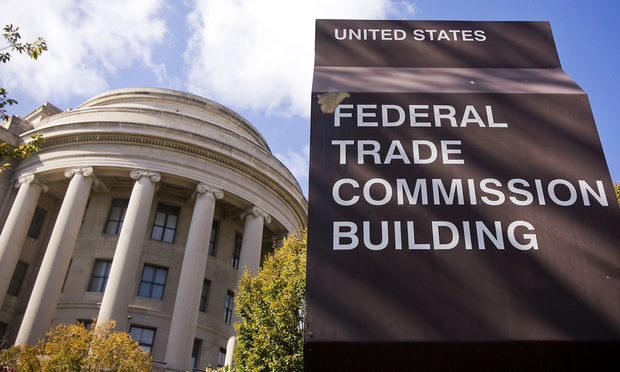Federal Trade Commission Putting Mega Bite Into Data Breach Consent Orders
The order released Wednesday against DealerBuilt contains several new provisions that general counsel will want to consider in any risk assessment, including one requiring executives to take more responsibility for compliance.
June 13, 2019 at 05:55 PM
4 minute read
 U.S. Federal Trade Commission building in Washington, D.C. Photo: Diego M. Radzinschi/ALM
U.S. Federal Trade Commission building in Washington, D.C. Photo: Diego M. Radzinschi/ALM
Responding to critics and at least one federal appeals court that have called its orders too weak and vague, the Federal Trade Commission has put more teeth into its latest proposed consent order in a data breach case.
The order released Wednesday contains several new provisions that general counsel will want to consider in any risk assessment, including one requiring executives to take more responsibility for compliance.
“The requirements are much more detailed and specific about what the company has to do to achieve compliance and maintain adequate security practices,” explained David Shonka, a former acting general counsel at the commission and now a partner at the Redgrave law firm in Washington, D.C. “It really does answer a lot of the criticisms that commission orders have been facing.”
The changes comes after the U.S. Court of Appeals for the Eleventh Circuit last summer tossed out the commission's cease and desist order against LabMD Inc., saying it was unenforceable because “it mandate[d] a complete overhaul of LabMD's data-security program and [said] precious little about how this is to be accomplished.”
Wednesday's order involves DealerBuilt, an Iowa-based company that sells software and data services to 130 of the country's largest auto dealerships. The software handles billions of dollars' worth of transactions, and the breach exposed the consumer data of 12.5 million customers.
In a complaint, the FTC alleged that DealerBuilt failed to implement readily available and low-cost measures to protect personal information it obtained from its auto dealer clients. DealerBuilt did not immediately return messages seeking comment Thursday.
The commission alleged that DealerBuilt didn't encrypt information, have a written data security policy, provide data security training to employees or contractors, do periodic risk assessments, monitor attempts to breach information, or have reasonable data access controls in place.
An employee allegedly bought a backup storage device and plugged it in without taking steps to secure it. A hacker was able to breach it multiple times and access the customers' Social Security numbers, driver's license numbers and dates of birth, along with payroll information about dealership employees.
The commission alleged that DealerBuilt violated the FTC Act's prohibition against unfair practices and the Gramm-Leach-Bliley Act's Safeguards Rule, which requires financial institutions to develop, implement, and maintain a comprehensive information security program.
Of special note to general counsel and chief compliance officers, the consent order requires the company to obtain third-party assessments of its information security program every two years. Under the order, the assessor must specify the evidence that supports its conclusions and conduct independent sampling, employee interviews, and document review.
Significantly it also requires a senior DealerBuilt manager to provide the commission with annual certifications of compliance.
The agreement requires DealerBuilt to conduct yearly employee training, monitor its systems for security incidents, implement access controls, and inventory devices on its network.
Earlier orders from the commission lacked such detailed requirements. “Earlier the commission's approach was sort of 'go forth and sin no more' while developing a suitable program for your organization,” Shonka said. The agency was reluctant to “take away the discretion and decision-making of businesspeople,” he added.
“My reading is the commission has done what its critics have been saying for a long time it needs to do: Be precise and make the boundaries clear,” Shonka said.
The deal will be subject to public comment for 30 days after publication in the Federal Register, after which the commission will decide whether to make the proposed consent order final.
This content has been archived. It is available through our partners, LexisNexis® and Bloomberg Law.
To view this content, please continue to their sites.
Not a Lexis Subscriber?
Subscribe Now
Not a Bloomberg Law Subscriber?
Subscribe Now
NOT FOR REPRINT
© 2025 ALM Global, LLC, All Rights Reserved. Request academic re-use from www.copyright.com. All other uses, submit a request to [email protected]. For more information visit Asset & Logo Licensing.
You Might Like
View All
'True Leadership Is About Putting Others First': 2024 In-House Award Winners Inspired, Took Road Less Traveled


Datasite's Ethics and Compliance Team Drives Transformation
Trending Stories
- 1Commentary: Tort Reform Is a Misleading Promise
- 2The Lawyers Waging the Legal Fight Against the Trump Administration
- 3McDermott's Onetime London Leader Headed to Pillsbury
- 4A&O Shearman To Lose Another Five Lawyers to EY
- 5Pearl Cohen Enters San Francisco Market Via Combination With IP Boutique
Who Got The Work
J. Brugh Lower of Gibbons has entered an appearance for industrial equipment supplier Devco Corporation in a pending trademark infringement lawsuit. The suit, accusing the defendant of selling knock-off Graco products, was filed Dec. 18 in New Jersey District Court by Rivkin Radler on behalf of Graco Inc. and Graco Minnesota. The case, assigned to U.S. District Judge Zahid N. Quraishi, is 3:24-cv-11294, Graco Inc. et al v. Devco Corporation.
Who Got The Work
Rebecca Maller-Stein and Kent A. Yalowitz of Arnold & Porter Kaye Scholer have entered their appearances for Hanaco Venture Capital and its executives, Lior Prosor and David Frankel, in a pending securities lawsuit. The action, filed on Dec. 24 in New York Southern District Court by Zell, Aron & Co. on behalf of Goldeneye Advisors, accuses the defendants of negligently and fraudulently managing the plaintiff's $1 million investment. The case, assigned to U.S. District Judge Vernon S. Broderick, is 1:24-cv-09918, Goldeneye Advisors, LLC v. Hanaco Venture Capital, Ltd. et al.
Who Got The Work
Attorneys from A&O Shearman has stepped in as defense counsel for Toronto-Dominion Bank and other defendants in a pending securities class action. The suit, filed Dec. 11 in New York Southern District Court by Bleichmar Fonti & Auld, accuses the defendants of concealing the bank's 'pervasive' deficiencies in regards to its compliance with the Bank Secrecy Act and the quality of its anti-money laundering controls. The case, assigned to U.S. District Judge Arun Subramanian, is 1:24-cv-09445, Gonzalez v. The Toronto-Dominion Bank et al.
Who Got The Work
Crown Castle International, a Pennsylvania company providing shared communications infrastructure, has turned to Luke D. Wolf of Gordon Rees Scully Mansukhani to fend off a pending breach-of-contract lawsuit. The court action, filed Nov. 25 in Michigan Eastern District Court by Hooper Hathaway PC on behalf of The Town Residences LLC, accuses Crown Castle of failing to transfer approximately $30,000 in utility payments from T-Mobile in breach of a roof-top lease and assignment agreement. The case, assigned to U.S. District Judge Susan K. Declercq, is 2:24-cv-13131, The Town Residences LLC v. T-Mobile US, Inc. et al.
Who Got The Work
Wilfred P. Coronato and Daniel M. Schwartz of McCarter & English have stepped in as defense counsel to Electrolux Home Products Inc. in a pending product liability lawsuit. The court action, filed Nov. 26 in New York Eastern District Court by Poulos Lopiccolo PC and Nagel Rice LLP on behalf of David Stern, alleges that the defendant's refrigerators’ drawers and shelving repeatedly break and fall apart within months after purchase. The case, assigned to U.S. District Judge Joan M. Azrack, is 2:24-cv-08204, Stern v. Electrolux Home Products, Inc.
Featured Firms
Law Offices of Gary Martin Hays & Associates, P.C.
(470) 294-1674
Law Offices of Mark E. Salomone
(857) 444-6468
Smith & Hassler
(713) 739-1250







